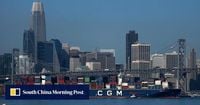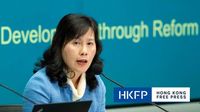The Hong Kong government is stepping up to take a leadership role in the logistics, shipping, and aviation sectors amid the ongoing instability caused by the US-China trade war, according to Secretary for Transport and Logistics Mable Chan. In an interview with the local newspaper Ming Pao, published on April 11, 2025, Chan outlined five strategies aimed at navigating the turbulent waters created by sweeping tariffs imposed by the United States.
The trade war, which has seen US tariffs on Chinese imports soar to an alarming 145 percent, has brought significant uncertainty to Hong Kong's economy, particularly affecting its vital logistics and shipping industries. Chan, who assumed her role in December 2024, emphasized that the government is committed to mitigating the impact of these tariffs on local businesses.
As the first step in their strategic response, the Hong Kong government plans to propose legislative amendments next year to expand the cargo exemption from customs declaration. This move is expected to attract transshipment cargo, which currently constitutes about 60 percent of the city’s freight. Chan noted that simplifying customs processes could significantly enhance the competitiveness of Hong Kong as a logistics hub.
In addition to easing customs regulations, the government aims to assist the trading sector in exploring emerging markets. Chan explained that local businesses have gradually shifted their focus from traditional markets in Europe and the US to Asia over the past decade. This strategic pivot is crucial for sustaining growth amidst the evolving global trade landscape.
Furthermore, the government plans to boost cargo volume by establishing interprovincial logistics channels with manufacturing hubs in mainland China. Chan is set to promote the services of the Hong Kong port during an upcoming trip to Chongqing, highlighting the city's capabilities in facilitating trade.
Expanding the city’s shipping network is another key strategy. The government intends to deepen cooperation and exchanges with international ports and shipping companies, including the establishment of a ship management office in the Middle East next year. This initiative aims to attract vessels to register in Hong Kong, reinforcing its status as a global shipping center.
Lastly, the government is looking to diversify aviation services by exploring aircraft leasing as a financing method. This approach could enhance the operational capacity of local airlines and provide them with greater flexibility in managing their fleets.
Despite the challenges posed by the trade war, Financial Secretary Paul Chan recently reaffirmed that Hong Kong would maintain its status as a "free port." He emphasized the city’s commitment to upholding free and open policies for its trading partners, asserting that Hong Kong’s fundamental trading principles will remain unchanged.
In a related development, Hong Kong shippers and trading groups have issued a strong warning against the practice of dumping cargo at sea to evade tariffs. This cautionary advice comes in light of reports that a Chinese exporter abandoned goods mid-voyage to avoid the hefty tariffs imposed by the US. Willy Lin Sun-mo, chairman of the Hong Kong Shippers’ Council, described such actions as "highly irrational and irresponsible," highlighting the severe consequences that could follow.
Lin explained that dumping goods at sea results in the total loss of the cargo, along with the inability to claim insurance due to failure in fulfilling contractual obligations. Moreover, exporters risk being sued by importers for damages, which could further tarnish their reputation and deter future business opportunities.
"This move will not only severely hurt its reputation and deter overseas buyers leading to diminishing orders, but also tarnish China’s trade reputation, which will be a lose-lose for everyone," Lin stated.
The situation has been exacerbated by US President Donald Trump’s recent announcement clarifying that Chinese imports would be subject to a staggering 145 percent tariff. He also implemented a 90-day pause that set levies at a baseline of 10 percent for most countries. This drastic measure has left many exporters scrambling to adapt to the new economic reality.
As the Hong Kong government navigates these turbulent times, the focus remains on supporting local businesses and ensuring that the city continues to thrive as a global trade hub. The proposed strategies aim not only to address immediate challenges but also to position Hong Kong for future growth in an increasingly competitive environment.






